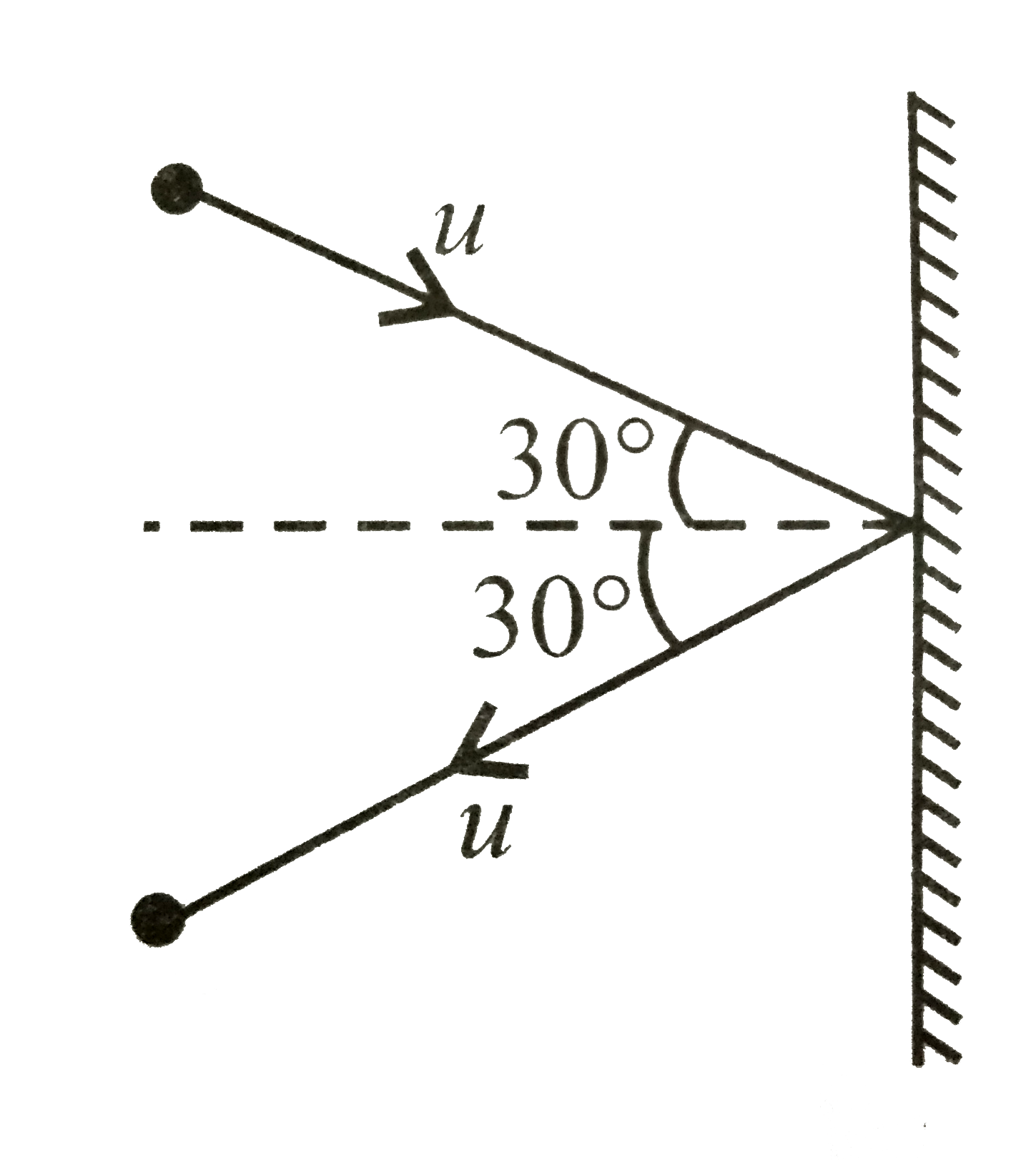Two billiard balls each of mass 0 .05 kg moving in opposite directions with speed 6ms−1 collide and rebound with the same speed What is the impulse imparted to each ball due to the other ?
To solve the problem of the impulse imparted to each billiard ball during their collision, we can follow these steps:
Step 1: Understand the Initial Conditions
We have two billiard balls, each with a mass of m=0.05kg, moving in opposite directions with a speed of v=6m/s.
Step 2: Determine the Initial Momentum of Each Ball
The initial momentum pi of each ball can be calculated using the formula:
pi=m⋅v
For ball A (moving to the right):
piA=0.05kg×6m/s=0.3kg m/s
For ball B (moving to the left):
piB=0.05kg×(−6m/s)=−0.3kg m/s
Step 3: Determine the Final Momentum of Each Ball
After the collision, both balls rebound with the same speed but in the opposite direction. Thus, the final momentum pf for each ball is:
For ball A:
pfA=0.05kg×(−6m/s)=−0.3kg m/s
For ball B:
pfB=0.05kg×6m/s=0.3kg m/s
Step 4: Calculate the Change in Momentum for Each Ball
The change in momentum Δp for each ball is given by:
Δp=pf−pi
For ball A:
ΔpA=pfA−piA=−0.3kg m/s−0.3kg m/s=−0.6kg m/s
For ball B:
ΔpB=pfB−piB=0.3kg m/s−(−0.3kg m/s)=0.6kg m/s
Step 5: Determine the Impulse Imparted to Each Ball
The impulse J imparted to each ball is equal to the change in momentum:
JA=ΔpA=−0.6kg m/s
JB=ΔpB=0.6kg m/s
Conclusion
The impulse imparted to each ball due to the other is:
- For ball A: −0.6kg m/s (indicating a change in direction)
- For ball B: 0.6kg m/s
We have two billiard balls, each with a mass of m=0.05kg, moving in opposite directions with a speed of v=6m/s.
The initial momentum pi of each ball can be calculated using the formula:
pi=m⋅v
For ball A (moving to the right):
piA=0.05kg×6m/s=0.3kg m/s
For ball B (moving to the left):
piB=0.05kg×(−6m/s)=−0.3kg m/s
After the collision, both balls rebound with the same speed but in the opposite direction. Thus, the final momentum pf for each ball is:
For ball A:
pfA=0.05kg×(−6m/s)=−0.3kg m/s
For ball B:
pfB=0.05kg×6m/s=0.3kg m/s
The change in momentum Δp for each ball is given by:
Δp=pf−pi
For ball A:
ΔpA=pfA−piA=−0.3kg m/s−0.3kg m/s=−0.6kg m/s
For ball B:
ΔpB=pfB−piB=0.3kg m/s−(−0.3kg m/s)=0.6kg m/s
The impulse J imparted to each ball is equal to the change in momentum:
JA=ΔpA=−0.6kg m/s
JB=ΔpB=0.6kg m/s
The impulse imparted to each ball due to the other is:
- For ball A: −0.6kg m/s (indicating a change in direction)
- For ball B: 0.6kg m/s
Topper's Solved these Questions
- BOOK - PRADEEPCHAPTER - LAWS OF MOTIONEXERCISE - Additional Examples / Exercises6videos
LAWS OF MOTION
- BOOK - PRADEEPCHAPTER - LAWS OF MOTIONEXERCISE - Short Answer Questions35videos
LAWS OF MOTION
- BOOK - PRADEEPCHAPTER - LAWS OF MOTIONEXERCISE - Advanced problems for competitions20videos
LAWS OF MOTION
- BOOK - PRADEEPCHAPTER - KINEMATICSEXERCISE - 1 NCERT Comprehension4videos
KINEMATICS
- BOOK - PRADEEPCHAPTER - MATHEMATICAL TOOLSEXERCISE - Fill in the blanks5videos
MATHEMATICAL TOOLS
Similar Questions
Two billiard balls each of mass 0 .05 kg moving in opposite directions with speed 6ms−1 collide and rebound with the same speed What is the impulse imparted to each ball due to the other ?
View SolutionTwo billiard balls each of mass 50g moving in opposite directions with a speed of 36km/h colide and rebound with the same velocity What is the impulse imparted to each ball due to other ?
View Solution
Knowledge Check
- Question 1 - Select One
If two balls each of mass 0.06kg moving in opposite directions with speed 4m/s collide and rebound with the same speed , then the impulse imparted to each ball due to other is
A0.48 kg-m/sB0.24 kg -m/sC0.81 kg -m/sDZero - Question 2 - Select One
If two balls each of mass 0.06kg moving in opposite directions with speed 4m/s collide and rebound with the same speed , then the impulse imparted to each ball due to other is
A0.48kgm/sB0.24kgm/sC0.81kgm/sDZero - Question 3 - Select One
Two billiard ball A and B each of mass 50g and moving in opposite direction with speed of 5ms−1 each, collide and rebound with the same speed. The impulse imparted to each ball is
A0.25kgms−1B0.5kgms−1C0.8kgms−1D0.125kgms−1
Two billiard balls A and B, each of mass 50 kg and moving in oppsite direction with speed of 5ms−1 each, collide and rebound with the same speed. If the collision lasts for 10−3s, which of the follwing statements are true?
View SolutionTwo billiard balls A and B, each of mass 50 kg and moving in oppsite direction with speed of 5ms−1 each, collide and rebound with the same speed. If the collision lasts for 10−3s, which of the follwing statements are true?
View SolutionTwo billiard balls A and B each of mass 50 g and moving in opposite directions with speed of 5m/s each, collide and rebound with the same speed if the collision lasts for 10−3 s which of the following statement(s) is (are) true?
View SolutionA ball of mass 'm' strikes a rigid wall with speed 'u' and rebounds with the same speed. The impulse imparted to the ball by the wall is
View SolutionA ball of mass m strikes a rigid walJ with speed u and rebounds with the same speed. The impulse imparted to the ball by the wall is
 View Solution
View Solution

